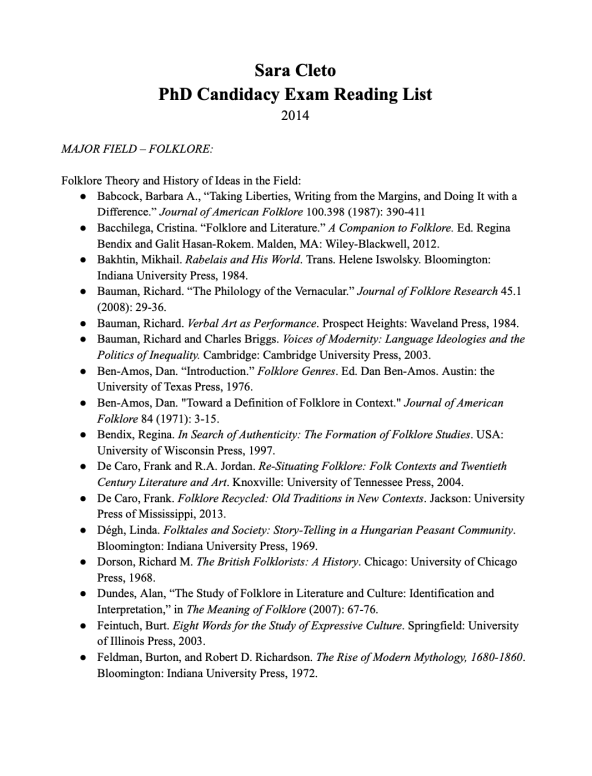
Want Our Folklore Candidacy Exam Reading Lists?
April 29, 2024
Or, what folklore graduate students actually study.
When you go for your PhD in the USA, you usually have to go through something called a “candidacy exam” or “comprehensive exam.”
At The Ohio State University, where we got our PhDs, this means you come up with the biggest reading list in the world, read and study like a fiend for about a year, and then take a massive two part exam that will determine whether you’re allowed to proceed with your PhD.
If you want to know more, here’s how it worked: Basically, once you’re done with all of your required coursework, you work with your advisors to come up with a ridiculously long list of texts that everyone agrees is essential to your major field (for us, this was folklore) and your minor field (for us, 19th-century British literature.) The list might be influenced by your eventual dissertation topic, but it’s usually more about proving that you’ve got a grip on your fields. You then spend two semesters reading that list and preparing for your actual exam. The exam has two parts: a written portion with two open-ended essay questions (one about your major field and one about your minor field) that you answer over 72-hours (using the knowledge you’ve gained from all your coursework and reading) and then a two-hour oral exam where you mostly talk about and defend what you wrote. If you pass, you become a “PhD Candidate,” and the only thing left to do before your get your PhD is write your dissertation.
One of the students in our Carterhaugh Writers Society (which ends today but went SO WELL that we’re going to do it again really soon – sign up for the waitlist here!) is writing about folklore graduate students in their novel, and they asked us what we thought were some of the “essential texts” every folklore students would know. We told them that, well, basically our advisors told us what they thought those texts were, and then we had to read them for our exams, after which they asked us if they could see our two reading lists.
To our great surprise, when we offered to send these lists to them, we were met with a chorus of other people asking for them too – so we’ve decided to share them with all of you! If you’ve ever wanted to know what folklore graduate students actually study and some of the things that academic folklorists are generally expected to know: TA DA!
Here’s Brittany’s list –
And here’s Sara’s list –
There will, of course, be a LOT of overlap, but since we specialized in slightly different ways, our reading lists reflect that. For example, Brittany’s list has a lot of Gothic stuff on it, while Sara’s list has several Disability Studies texts. They’re also divided up slightly differently based on what our different advisors wanted, but they’re both pretty easy to follow. (Of course, folklorists who specialize in occupational folklore or festival or vernacular religion would have readings lists that are a bit different, but many of these texts will be familiar to pretty much anyone with a PhD in folklore.)
We hope you find these interesting/helpful as you navigate your own folklore/fairy-tale/19th-century British fantastic literature studies!





I am hugely jealous that your advisors actually gave you reading lists. I asked mine what they wanted me to learn for my candidacy and every single one of them said, “What do YOU think you should know?” And then I said a lot of bad words inside my head and nearly had a nervous breakdown.
We didn’t have written components in science, either. It was just a bunch of old dudes in a room asking me totally random questions until I broke down and started saying “I don’t know.” To this day, I suspect that you pass or fail based on how many hours it takes to get you to that point. I lasted three, which evidently was enough!
Grad school. Good times.
We’re so sorry to hear how awful your experience was! You’re far from alone – we don’t know if that makes it better or worse to know – and we hate that it’s ever that hostile.
Our advisors didn’t actually give us the lists though. We were expected to come up with our lists on our own, and then all committee members gave input, usually in the form of additional texts they wanted us to add.
Thanks for sharing these!
You’re very welcome!